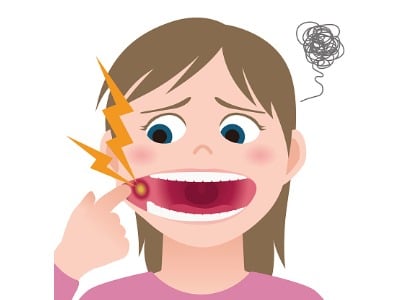Contents
Introduction
Canker sores, also known as aphthous ulcers, are small, shallow lesions that develop on the soft tissues inside your mouth or at the base of your gums. Unlike cold sores, they don’t appear on the surface of your lips and aren’t contagious. Despite their benign nature, canker sores can be quite painful, making eating and talking uncomfortable. These common oral lesions affect a significant portion of the population at some point in their lives.
What Are Canker Sores?
Canker sores typically present as round or oval ulcers with a white or yellow center and a red border. Maintaining good oral health is crucial in preventing canker sores and managing their discomfort when they do occur. They usually appear on the inside of the lips, cheeks, or under the tongue. Common symptoms include a painful sore or sores inside your mouth, a tingling or burning sensation before the sores appear, and swollen and painful lymph nodes. These symptoms can make everyday activities like eating, drinking, and speaking quite uncomfortable.

Causes of Canker Sores
The exact cause of canker sores remains unclear, but several factors may trigger their development. One common cause is injury to the mouth, which can result from dental work, aggressive brushing, sports accidents, or accidentally biting your cheek. Food sensitivities also play a role; certain foods like citrus fruits, tomatoes, nuts, chocolate, coffee, and spicy or acidic foods can trigger sores. Nutritional deficiencies, particularly a lack of vitamin B-12, zinc, folate, and iron, are also linked to their occurrence. Additionally, stress and hormonal changes, especially in women, can lead to the development of canker sores. Lastly, underlying health conditions such as celiac disease, inflammatory bowel diseases, and a weakened immune system can increase susceptibility.
Recognizing the Symptoms
Canker sores typically present as round or oval ulcers with a white or yellow center and a red border. They usually appear on the inside of the lips, cheeks, or under the tongue. Common symptoms include a painful sore or sores inside your mouth, a tingling or burning sensation before the sores appear, and swollen and painful lymph nodes. These symptoms can make everyday activities like eating, drinking, and speaking quite uncomfortable.
Treatment and Relief Options
Most canker sores heal on their own within one to two weeks. However, there are several measures you can take to alleviate discomfort and speed up the healing process. Over-the-counter remedies, such as mouth rinses, pastes, or gels containing benzocaine or hydrogen peroxide, can provide relief. Avoiding trigger foods that irritate your mouth is also crucial. Maintaining good oral hygiene with a soft-bristled toothbrush and avoiding mouthwashes containing alcohol can prevent further irritation. In severe cases, doctors may prescribe oral medications or corticosteroid ointments to manage pain and promote healing.

Prevention Tips
Canker sores, also known as aphthous stomatitis, are small, shallow lesions that develop on the soft tissues inside your mouth or at the base of your gums. While it may not be possible to completely prevent canker sores, there are several strategies to reduce their frequency. Avoid foods that irritate your mouth by identifying and steering clear of triggers.
Practicing good oral hygiene, including regular brushing and flossing, helps keep your mouth clean and free from injury. Managing stress through techniques like meditation and exercise can reduce stress-induced canker sores. Ensuring a balanced diet with adequate vitamins and minerals, particularly iron, zinc, folate, and vitamin B-12, supports overall oral health and may prevent deficiencies linked to canker sores.
Conclusion
Canker sores are a common but manageable condition. Understanding the triggers and symptoms can help you take proactive steps to prevent their occurrence and manage the discomfort when they do appear. While most canker sores heal on their own, it’s important to seek medical advice if you experience frequent or unusually large and painful sores. A healthcare professional can provide a thorough evaluation and recommend appropriate treatments to alleviate pain and promote healing. By following preventive measures and maintaining good oral hygiene, you can reduce the likelihood of developing these painful mouth ulcers.



